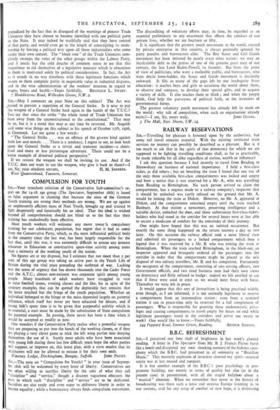RAILWAY RESERVATIONS
Sm,—Travelling for pleasure is frowned upon by the authorities, but some rail travel remains essential. With the existing restricted train services no journey can possibly be described as a pleasure. But is it too much to ask that in the spirit of that democracy for which we are supposed to be fighting travelling conditions shall, as far as practicable, be made tolerable for all alike regardless of station, wealth or influence?
I ask this question because I had recently to travel from Reading to Shrewsbury on business of national importance. I held a first-class ticket, as did others ; but on boarding the train I found that one out of the only three available first-class compartments was locked and empty and bore a notice that it was reserved for a Mr. A., who was travelling from Reading to Birmingham. No such person arrived to claim the compartment, but a request made to a railway company's inspector that it should be unlocked was curtly refused on the ground that Mr. A. would be joining the train at Didcot. However, no Mr. A. appeared at Didcot, and the compartment remained empty until the train reached Banbury. At that station a newcomer, possessing intelligence and a suitable device, unlocked the door,.and those unfortunate first-class-ticket- holders who had stood in the corridor for several hours were at last able to secure a modicum of comfort for the remainder of their journey.
One might have hoped that this was an isolated occurrence. But exactly the same thing happened on the return journey a day or two later. On this occasion the railway official took a more liberal view and admitted six passengers to a locked compartment which bore a legend that it was reserved for a Mr. B. who was joining the train at Birmingham. When the train reached Birmingham, in the black-out, an inspector appeared and brusquely ordered all the passengers into the corridor in order that the compartment might be placed at the sole disposal of two solitary travellers, Mr. B. and his companion. Fortunately the occupants of the compartment, consisting of two serving officers, two Government officials, and two tired business men had their own views on democracy and flatly refused to budge: indeed we felt entitled to say that if force were used to eject us we would meet force with force. Thereafter we were left in peace.
It would appear that this sort of favouritism is being practised widely, even though, as I am informed, it is not normally legitimate to reserve a compartment from an intermediate station: even from a terminal station it can in peace-time only be reserved for a full complement of passengers. Who is responsible for granting these undemocratic privi- leges and causing compartments to travel empty for hours on end while legitimate passengers stand in the corridors and arrive too weary to work? One would like to know.—Yours faithfully, 244 Peppard Road, Emmer Green, Reading. ARTHUR SIMONS.


























 Previous page
Previous page